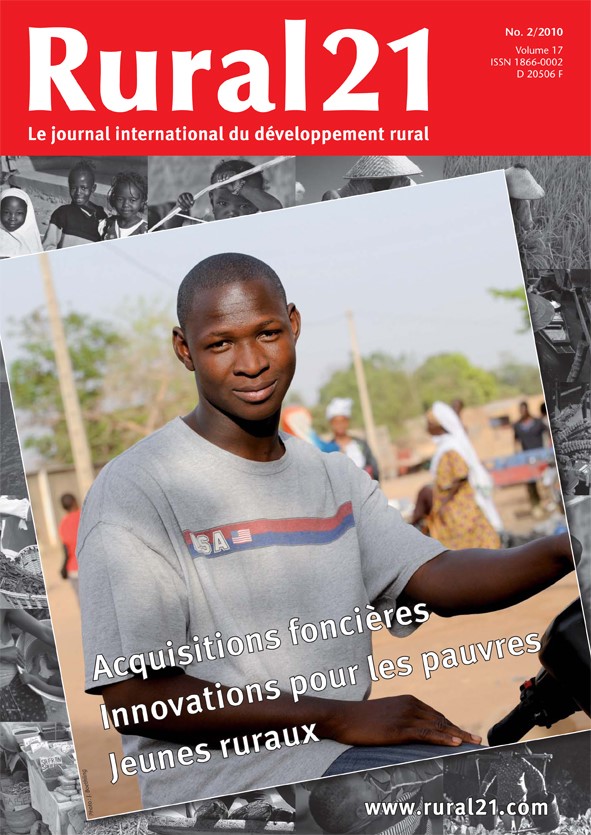Location
The international journal Rural 21 has dedicated more than 40 years to all topics surrounding rural development. Its ambition is to further those strategies and policies that strengthen rural areas of developing and newly industrialising countries and encourage their implementation. The journal addresses the complete range of relevant themes – from agriculture and fisheries via capacity building and education through to health and social security, energy supply and trade. Center-stage is always devoted to inquiring into how measures and strategies can contribute to global food security and to reducing poverty.
Rural 21 desires to further the dialogue between science and politics, the private sector, civil society and practitioners. Two platforms are designed for this purpose: Rural 21 in print is published four times a year, each issue highlighting a specific focus of rural development – this print edition is read in more than 150 countries. In parallel, Rural 21 online keeps the rural development community up to date on news and events, scientific findings and other print and online publications.
Rural 21 is published by DLG-Verlag GmbH in Frankfurt/Germany. Financial partners are BMZ (German Federal Ministry for Economic Cooperation and Development), GIZ (Deutsche Gesellschaft für Internationale Zusammenarbeit), DLG (German Agricultural Society – Deutsche Landwirtschaft-Gesellschaft), SDC (Swiss Agency for Development and Cooperation) and Helvetas Swiss Intercooperation.
The first issue of Rural 21 dates back to 1968. From 1974 to 2007, the journal was published in three languages entitled "entwicklung & ländlicher raum" / "agriculture & rural development" / "agriculture & développement rural". In 2008, the journal was relaunched as "Rural 21".
Members:
Resources
Displaying 206 - 210 of 319The role of local migration in African development
Surveys over several years in the Kagera region of Tanzania have shown that migration has a positive impact on people's living standards, even for those who remain in agriculture. On the other hand, there is evidence of migrants ending up in unfavourable social environments and perhaps even that the traditional home communities are protecting their livelihood and survival by setting up subtle exit barriers, in the form of norms, preventing migration of their most productive members. So, should migration be encouraged at all costs?
Adapting African agriculture to climate change
Climate change is one of the major threats to the development of rural Africa, and without wide-ranging adaptation strategies the challenge it presents cannot be met. Although appropriate measures have been identi? ed, international funding for adaptation has not materialised at the rate that was pledged. This is irresponsibly delaying the implementation of adaptation measures.
International migration flows: key data and trends
Migration is a huge phenomenon. The share of migrants in industrial countries’ populations doubled over the past three decades, and remittances ? ows to developing countries are larger than foreign investment or overseas aid. In many developing countries the percentage of the population working abroad and the percentage of Global Domestic Product (GDP) represented by remittances run into double digits.
Female migration: cultural and social change in Bangladesh
The debate about the e? ects of migration is still centred on economic aspects. However, the return of migrants also changes the society and cultures of their country of origin. These changes are particularly pronounced where women have emigrated and return to their communities after several years’ absence.
Le défi de l'élevage
Dans les pays en développement, l'élevage représente plus d'un tiers du produit intérieur agricole brut ; la croissance et la transformation rapides du secteur de l'élevage dans de grandes régions de la planète ont débouché sur une amélioration des revenus et de la situation alimentaire d?un grand nombre de personnes. Cette « révolution de l'élevage » a cependant largement négligé les producteurs pauvres ; elle a, en outre, accru le risque de zoonoses et été à l'origine de dégradations environnementales.



